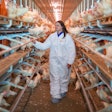The article says that in British Columbia, the cities of Richmond, Vancouver, and Whistler have vowed that their municipal cafeterias will serve only cage-free eggs, and notes that Ben & Jerry’s, Google, and Burger King in the United States, along with several universities in Canada either have followed suit to ban eggs produced in battery cages, or plan to phase in cage-free.
“But the recent spate of corporate promises hasn’t had the trickle-down effect that animal rights activists have hoped for. Consumers still aren’t rushing to buy cage-free eggs, and until that happens, egg producers say there’s no reason to tear out their cages,” the article says.
Less than 3 percent of the eggs sold in Canada are laid by roaming hens, the Canadian Egg Marketing Agency says. Consumers pay an average of $2.31/dozen for regular eggs and $4.16 for cage-free eggs.
In the United Stages, a dozen large Grade A conventional eggs sold for an average of $1.18, according to a recent survey of 17,000 retailers by USDA. That compares with $2.58 for cage-free eggs, and $3.53 for organic eggs.
The article continues that while cage-free sales have grown slightly in recent years, they are nowhere near the skyrocketing sales of other specialty brands, such as omega-3.













